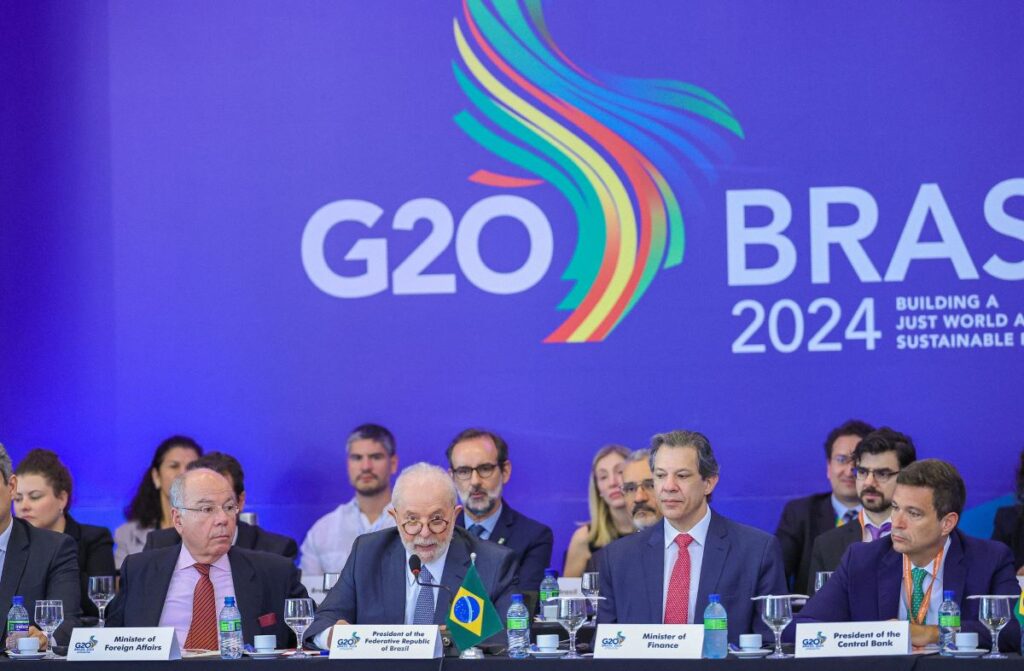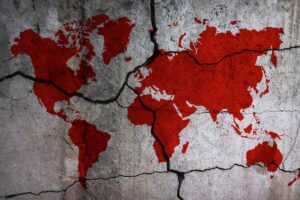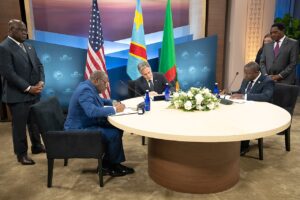On December 1, 2023, Brazil assumed the presidency of the G-20, which it will hold for a year, in a very challenging international political and economic environment. Just as the world was recovering from the pandemic, Russia’s invasion of Ukraine in February 2022 worsened the global food security crisis and led to heightened calls from Global South countries to reform multilateral organizations. The intensified Israel-Hamas conflict in the Middle East is likely to exacerbate these trends. Within this context, Brazil’s government has a unique opportunity to leverage its role within the G20 to advance some of its interests and other common demands from the Global South. Such opportunities are closely linked to U.S. interests, especially considering that the United States will assume the G20 presidency in 2026.
The increasing influence of the Global South in the G-20
The G-20 was established as an informal group at the G-7 Finance Ministers meeting in September 1999. Although closely linked to the Asian financial crisis of the late 1990s, the move also reflected the growing inability of the G-7/8 system to resolve specific issues of global financial governance and highlighted the need to involve the so-called emerging economies in such processes. After its creation, the G-20 was to focus exclusively on financial issues; the finance ministers met annually for almost 10 years. However, in 2008, in response to the new U.S. economic crisis, the G-20 was reconfigured more robustly and included annual summits of heads of state in addition to the annual meeting of finance ministers.
As the international economy stabilized, the G-20 underwent significant innovations, which underlined the increasing influence of Global South countries on the international scene.
The G-20 has broadened its agenda. It started to include issues of notable relevance for Global South states beyond the traditional topics, such as financial stabilization, economic recovery, and the reform of the international financial architecture. During the past decade, the agenda expanded to include food security, climate change and green growth, infrastructure investment, corruption, gender equality, global health, new technologies, and security-related issues.
Leveraging this opportunity, the BRICS (a group of emerging economies originally formed by Brazil, Russia, India, China, and South Africa) began to assert their own agenda. It started to engage the G-20, reiterating its members’ various policy positions and demands for changes in the global governance architecture, particularly focusing on the reform of the International Monetary Fund (IMF). In addition, in 2014, BRICS countries’ foreign ministers issued a joint statement against the potential exclusion of Russia from the 2014 G-20 Brisbane Summit, following Russia’s occupation of Crimea. Other emerging economies, such as Mexico, also supported this statement. During the 2022 G-20 Summit in Indonesia, despite Russian President Vladimir Putin’s absence from the event, Russia received the other BRICS members’ support and avoided a strong condemnation of the invasion of Ukraine in the final summit declaration.
Similarly, the succession of G-20 presidencies held by emerging middle powers has also contributed to the affirmation of a “Global South agenda” in the G-20. Following Indonesia’s presidency in 2022, three countries that are founding members of BRICS and IBSA (India-Brazil-South Africa Dialogue Forum) form the current G-20 troika: India (2023), Brazil (2024), and South Africa (2025).
Brazil’s G-20 agenda in 2024
In September 2023, Brazil announced its theme for the 2024 G-20 ― “Building a Just World and a Sustainable Planet” ― and its three priorities: fighting inequality, promoting social inclusion and fighting hunger; combating climate change, promoting energy transition and sustainable development; and reforming global governance institutions.
The G-20 negotiating structure consists of the Sherpa and Financial Tracks. The Sherpa Track is a preparatory process that leads up to the annual G-20 summit. It involves a series of meetings and negotiations among sherpas, who are foreign ministers of the G-20 countries. For the Financial Track, formed by finance ministers, Brazil’s priorities are to finance the fight against climate change, offer debt relief for poor countries (which today largely involves China as a creditor), promote a fairer international tax system (which seeks to go beyond what the Organisation for Economic Co-operation and Development and the G-20 have discussed at previous summits), and reform international financial institutions and strengthening the role of multilateral development banks.
Brazilian policymakers often assert that the G-20 is not an event, but part of a process. This is because the country wants to consolidate its place as a key player in solving environmental problems in a series of international events — most notably the Conference of Parties (COP) 30, which will occur in Brazil in 2025, and the BRICS summit the same year. In doing so, Brazilian President Luiz Inacio Lula da Silva also wants to affirm his country’s leadership in the Global South, amidst competition with India, which hosted the G-20 in 2023.
Indeed, both countries are vying for a leading role in representing the aspirations and demands of the Global South, using multilateral policy spaces, including the G-20, to do so. Last year, when Indian Prime Minister Narendra Modi was president of the G-20, Modi emerged as a key leader in the absence of Chinese leader Xi Jinping, consolidating the African Union’s entry into the group. In parallel, Lula da Silva participated in the last three events of relevance to the Global South: the BRICS Summit in South Africa, the G-20 Summit in India, and the G-77 summit in Cuba.
In contrast to India’s strategy, the Brazilian government has focused on creating a “participatory G-20,” a hallmark of the Brazilian presidency under Lula da Silva, who has made democracy and social rights his priorities. The federal government’s goal is to encourage all the G-20’s engagement groups to be inclusive and open to international social participation.
The T-20, an engagement group of think tanks and research centers of the G-20 member countries, opened an unprecedented process of consultation with both national and international academic and civil society institutions, creating an advisory council with gender-balanced representation and regular meetings.
The government also called for a “Social G-20,” which aims to gather various civil society organizations with all 13 engagement groups in a meeting just before the Heads of State summit in Rio de Janeiro in November 2024. The success of this unprecedented initiative in the history of the G-20 will depend on the mobilization of Brazilian civil society, which will have to take up the role of host and call on its counterparts abroad to make the process transparent and democratic.
Although the G-20 is a broader organization than the G-7, it remains a small club, which, despite promoting multilateralism, has had few concrete achievements in areas such as climate change mitigation, social policies, and gender and health issues. Although the summits in Toronto (2009), Hamburg (2017) and Buenos Aires (2018) were followed by protests outside the venue of the heads of government, there are discussions in Brazil about holding a “people’s summit,” which is a historical frame of action of social movements and civil society organizations. It differs from the “social G-20” in that it maintains autonomy from governments and is, therefore, able to include debates and actors not represented in the official spaces, while maintaining a dialogue with the official engagement groups and heads of government to push for new agendas.
An opportunity for the United States to spur diplomatic cooperation
The next G-20 Troika will include the U.S. presidency in 2026, and that of Brazil (2024) and South Africa (2025). Although the outcome of the 2024 U.S. presidential election is uncertain, the Troika is an opportunity for the Biden administration to seize the moment of the G-20 in Brazil and engage with Brazil, South Africa, and other countries in the Global South.
The Biden administration seems to understand this and has developed a new approach to the Global South, largely because of the challenge that China and Russia pose to U.S. interests in the geopolitical arena. Some of these new forms of engagement include the new India-Middle East-Europe Economic Corridor and the intention to scale up the G-7’s Partnership for Global Infrastructure and Investment. Notably, India is emerging as a key economic and security ally of the United States in Asia. President Joe Biden also supported the African Union’s bid to become a permanent member of the G-20.
Nevertheless, in order to be successful, the U.S. approach should include support for the reform of global governance institutions. Such support should be aligned with the demands of the countries of the Global South and should focus on the reform of the United Nations Security Council and the international financial institutions, especially the IMF and the World Bank. The United States should also support a global public investment agenda to meet the development needs of the South and deliver its climate-financing commitments.
The legitimacy of the liberal international order has been severely challenged in recent years. More than ever, the United States faces a critical dilemma regarding its position toward this order — whether to support its reform or to defend the status quo. In this context, the G-20 seems particularly relevant as a forum for establishing interaction and cooperation with the countries of the Global South, as well as for partnering with them to strengthen their push for the reform of global governance.
For its part, Brazil, as an important emerging country, looks forward to leveraging the G-20 as one part of a larger process to advance the interests of Global South countries. Its presidency can be a decisive step in Brazil’s return to the international arena as a relevant player after the tragic years under the Temer and Bolsonaro governments (2016-2022). Therefore, the next two years will be crucial for both Brazil and the United States. On Brazil’s end, it will be about how the country will handle the G-20 presidency, COP 30, and the BRICS summit. For the United States, its actions will show what role it wants to play in the future of the international order and how successful it is in its efforts to engage with the Global South. As such, the 2024 G-20 summit is likely to be a key moment for the foreign policy strategies of both countries.
Ana Garcia is an Associate Professor at the Federal Rural University of Rio de Janeiro; Leonardo Ramos is an Associate Professor at the Pontifical Catholic University of Minas Gerais, Brazil.
We thank Aude Darnal for her rich insights and suggestions on the earlier versions of this paper.




